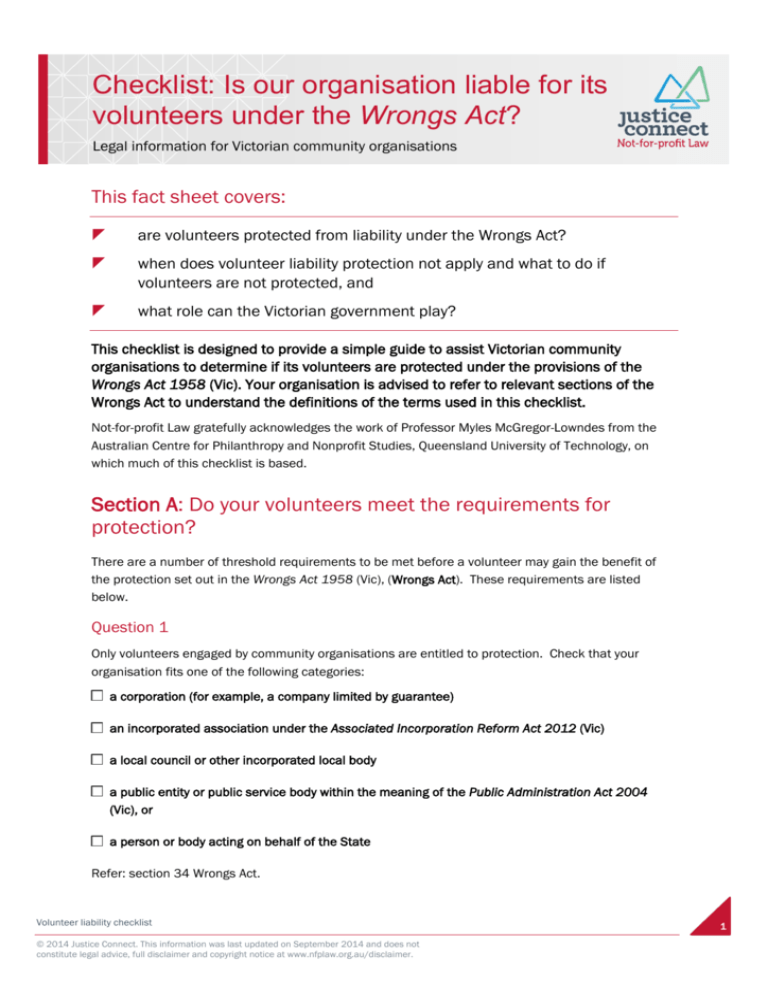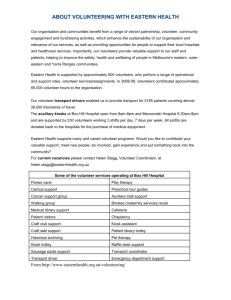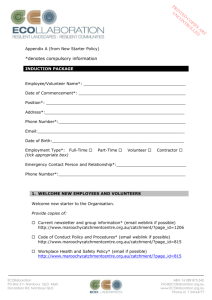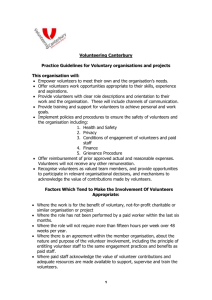
Checklist: Is our organisation liable for its
volunteers under the Wrongs Act?
Legal information for Victorian community organisations
This fact sheet covers:
are volunteers protected from liability under the Wrongs Act?
when does volunteer liability protection not apply and what to do if
volunteers are not protected, and
what role can the Victorian government play?
This checklist is designed to provide a simple guide to assist Victorian community
organisations to determine if its volunteers are protected under the provisions of the
Wrongs Act 1958 (Vic). Your organisation is advised to refer to relevant sections of the
Wrongs Act to understand the definitions of the terms used in this checklist.
Not-for-profit Law gratefully acknowledges the work of Professor Myles McGregor-Lowndes from the
Australian Centre for Philanthropy and Nonprofit Studies, Queensland University of Technology, on
which much of this checklist is based.
Section A: Do your volunteers meet the requirements for
protection?
There are a number of threshold requirements to be met before a volunteer may gain the benefit of
the protection set out in the Wrongs Act 1958 (Vic), (Wrongs Act). These requirements are listed
below.
Question 1
Only volunteers engaged by community organisations are entitled to protection. Check that your
organisation fits one of the following categories:
a corporation (for example, a company limited by guarantee)
an incorporated association under the Associated Incorporation Reform Act 2012 (Vic)
a local council or other incorporated local body
a public entity or public service body within the meaning of the Public Administration Act 2004
(Vic), or
a person or body acting on behalf of the State
Refer: section 34 Wrongs Act.
Volunteer liability checklist
© 2014 Justice Connect. This information was last updated on September 2014 and does not
constitute legal advice, full disclaimer and copyright notice at www.nfplaw.org.au/disclaimer.
1
Question 2
To be entitled to protection the work performed by volunteers must be performed on a ‘voluntary
basis’. A person will have performed the work on a voluntary basis if they receive any of the following:
no remuneration for doing the work
only remuneration of their reasonable expenses incurred in doing the work (for example, travel
and meal costs)
payment from their normal employer while they perform community work, or
remuneration within the limits prescribed by the Wrongs Act regulations (no limit prescribed at the
time of publication)
Refer: section 35 Wrongs Act.
If ANY apply go to Question 3
If NONE apply go to Section D
Question 3
The work performed by the volunteer must be community work. Community work is work performed
for one or more of the following purposes:
Charitable
Religious
Educational
Benevolent
Promoting and encouraging Literature, Science or Arts
Sporting
Recreational
Amusement
Tourism
Conserving or protecting the environment
Political
Promoting community interests
Community , social or cultural centres
Refer: section 36 Wrongs Act for the definition of "community work".
If ANY apply go to Question 4
Volunteer liability checklist
© 2014 Justice Connect. This information was last updated on September 2014 and does not
constitute legal advice, full disclaimer and copyright notice at www.nfplaw.org.au/disclaimer.
2
If NONE apply go to Section D
Question 4
The community work performed must be organised by the community organisation.
For example, if your organisation trains a person to use a machine and directs that person to use it,
he/she will be performing work organised by your organisation. A person who starts working without
approval or direction from your organisation would not be performing work organised by your
organisation.
Was the work performed by the volunteer organised, directed or supervised by the community
organisation?
Yes - If YES go to Question 5
No - If NO go to Section D
Refer: sections 34 and 37 Wrongs Act.
Question 5
Volunteers are only protected if they were providing a service in relation to the community work. Was
the volunteer at the relevant time providing a service in relation to the community work?
Yes – If YES go to Question 6
No - If NO go to Section D
Refer: section 37 Wrongs Act
Question 6
The protection is only afforded for civil liabilities. Was the liability incurred by the volunteer for a civil
liability (for example, negligence causing physical injury) and not a criminal prosecution (for example,
stealing or assault)?
Yes - If YES go to Question 7
No - If NO go to Section D
Refer: section 37 Wrongs Act.
Question 7
Certain types of civil liability are excluded from the protection provisions. Was the liability incurred by
the volunteer one of the following types?
Liability for defamation – Go to Section D
Liability for personal injury due to a motor vehicle accident – Go to Section D
If NONE apply go to Question 8
Refer: section 38(2) Wrongs Act.
Volunteer liability checklist
© 2014 Justice Connect. This information was last updated on September 2014 and does not
constitute legal advice, full disclaimer and copyright notice at www.nfplaw.org.au/disclaimer.
3
Question 8
The protection is only available after a certain date. Was the liability incurred by the volunteer after 15
March 2003?
Yes - If YES go to Section B
No - If NO go to Section D
Refer: section 1 Wrongs Act.
Section B: When does the protection not apply to volunteers?
A volunteer is not automatically protected by meeting the threshold requirements of the legislation
outlined in Section A. There are specific situations where the protection will not apply. These
situations are listed in Question 9 below.
Question 9
Volunteers who fall under certain categories are not protected. Does the volunteer come under one of
the following categories?
working under a court imposed order
an officer or member as defined by the Country Fire Authority Act 1958 (Vic) (Country Fire Authority
Act) while exercising power or performing a duty imposed under that Act or the Dangerous Goods
Act 1985 (Vic) (Dangerous Goods Act)
an officer or member of industry brigade as defined by the Country Fire Authority Act while
exercising a power or performing a duty imposed under that Act or the Dangerous Goods Act.
a volunteer auxiliary worker within the meaning of the Country Fire Authority Act engaged in an
authorised activity under that Act.
a person complying with a direction given under the provisions of Country Fire Authority Act
a volunteer emergency worker under the Emergency Management Act 1986 (Vic) (Emergency
Management Act) engaged in an emergency activity within the meaning of that Act.
a volunteer emergency worker under the Emergency Management Act exercising a power or
performing a duty imposed under the Victoria State Emergency Services Act 2005 (Vic).
Refer: section 35 Wrongs Act.
If ANY apply go to Section D
If NONE apply go to Question 10
Volunteer liability checklist
© 2014 Justice Connect. This information was last updated on September 2014 and does not
constitute legal advice, full disclaimer and copyright notice at www.nfplaw.org.au/disclaimer.
4
Question 10
Certain acts of the volunteer will exclude their ability to claim protection. Was the volunteer, at the
time of the act or omission, acting in any of the following ways?
not acting in good faith
intoxicated as a result of voluntarily consuming alcohol or a drug that was not for a therapeutic
purpose
acting outside the scope of the community work organised by the community organisation
acting contrary to instructions given by the community organisation
Refer: sections 37 and 38(1) Wrongs Act.
If ANY apply go to Section D
If NONE apply go to Section C
Section C: Volunteer protection provisions
If you have answered all questions in sections A, B and C, and the answer does not result in “go to
section D”, the protection afforded by the legislation is likely to be granted to volunteers engaged by
your organisation. If you are in doubt, seek legal advice.
What does it mean if your volunteers are protected?
If your volunteers are protected, this means they should not incur personal civil liability as a result of
performing community work organised by your community organisation.
Under the Wrongs Act, the liability incurred by the volunteer is transferred to the volunteer’s
community organisation and the organisation will be liable as if it were the principal volunteer. If your
community organisation was involved in a combined undertaking with another community
organisation, go to section E.
It is recommended that you seek legal advice about how this legislation specifically applies to your
organisation before acting on the content of this general publication.
Section D: Your volunteers may not be protected, what does
this mean?
If your volunteers are not protected by the provisions of the Wrongs Act, your volunteers remain
personally liable for their actions. They may be either sued individually, or joined to an action against
your community organisation, for their acts and omissions while performing community work. It is
recommended that you seek legal advice in this context.
If the volunteers fell under the categories outlined in question 8, (that is, the liability was incurred
before 15 March 2003) they may be protected under another legislative regime. It is recommended
that you examine the laws relevant to these volunteers and how they applied to them at the time any
cause of action arose. It is recommended that you seek legal advice about how this legislation applies
to your organisation before acting on the content of this publication.
Volunteer liability checklist
© 2014 Justice Connect. This information was last updated on September 2014 and does not
constitute legal advice, full disclaimer and copyright notice at www.nfplaw.org.au/disclaimer.
5
Section E: Was the community work principally organised by
your community organisation?
If more than one community organisation is involved in organising the community work, it is the
community organisation that chiefly or mainly organised the work that is liable for the conduct of the
volunteer.
Question 11
Was your community organisation the principal/main organiser of the community work?
Yes - If YES, the liability incurred by the volunteer will most likely be transferred to your community
organisation.
No - If NO, the liability incurred by the volunteer will most likely betransferred to the principal
organiser of community work.
Refer: section 39 (2) Wrongs Act.
It is recommended that you seek legal advice about how this legislation applies to your organisation
before acting on the content of this publication.
Section F: Is it possible for the State of Victoria to assume the
liability of the community organisation?
The State of Victoria may assume the liability of the volunteer that is transferred to the community
organisation under the Wrongs Act, if the community organisation is:
a public entity or public service body within the meaning of the Public Adminstration Act 2004
(Vic), or
a person or body acting on behalf of the State.
Refer: section 39 (3) Wrongs Act.
It is recommended that you seek legal advice about how this legislation applies to your organisation
before acting on the content of this publication.
Volunteer liability checklist
© 2014 Justice Connect. This information was last updated on September 2014 and does not
constitute legal advice, full disclaimer and copyright notice at www.nfplaw.org.au/disclaimer.
6
Resources
Related Not-for-profit Law Resources
See our Volunteers webpage at www.nfplaw.org.au/volunteers
See our Insurance and Risk webpage at www.nfplaw.org.au/riskinsurance
Legislation
Wrongs Act 1958 (Vic)
Transport Accident Act 1986 (Vic)
Country Fire Authority Act 1958 (Vic)
Emergency Management Act 1986 (Vic)
Victoria State Emergency Services Act 2005 (Vic)
A Not-for-profit Law Information Hub resource. Access more resources at www.nfplaw.org.au
© 2014 Justice Connect. You may download, display, print and reproduce this material for your personal use, or
non-commercial use within your not-for-profit organisation, so long as you attribute Justice Connect as author and
retain this and other copyright notices. You may not modify this resource. Apart from any use permitted under the
Copyright Act 1968 (Cth), all other rights are reserved.
To request permission from Justice Connect to use this material, contact Justice Connect at PO Box 16013,
Collins Street West, Melbourne 8007, or email nfplaw@justiceconnect.org.au
Volunteer liability checklist
© 2014 Justice Connect. This information was last updated on September 2014 and does not
constitute legal advice, full disclaimer and copyright notice at www.nfplaw.org.au/disclaimer.
7






